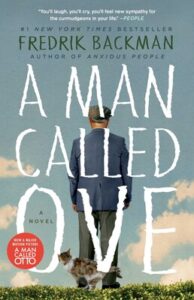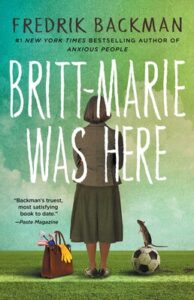 I always wanted to start a series of posts called “Books That Connect Us” highlighting topics that often divide us. Remaining open minded and curious through our differences is key to finding common ground. Reading can inspire us to start building this common ground as we listen to diverse characters, look for points where they are able to agree, and develop an understanding that evolves from wiping out judgment, bias, and hate in the meantime. In this post let’s see how we can benefit from mutual appreciation and wisdom across generations by taking a look at books written by Swedish author Fredrik Backman from a new perspective.
I always wanted to start a series of posts called “Books That Connect Us” highlighting topics that often divide us. Remaining open minded and curious through our differences is key to finding common ground. Reading can inspire us to start building this common ground as we listen to diverse characters, look for points where they are able to agree, and develop an understanding that evolves from wiping out judgment, bias, and hate in the meantime. In this post let’s see how we can benefit from mutual appreciation and wisdom across generations by taking a look at books written by Swedish author Fredrik Backman from a new perspective.
When our own Jenny Coffman brought a short text from Fredrik Backman’s Beartown to one of the Tales We Read discussions back in fall 2019, I didn’t think I’d be ever interested in reading a whole YA novel about high school hockey players somewhere in a Scandinavian country. But the writing in the excerpt was exquisite. Long story short, I ended up reading the whole book, then picked up the next one, Us against you, and the next one, The Winners, too, once it was published.
I must admit it was not the struggles of the young characters that appealed to me in the Beartown-trilogy. Instead, it was the portrayal of the adults’ attitudes to these youngsters, whether as parents, coaches, or just figures tangential to the main story line. These books feature an unorthodox, age-inclusive narrative as the author uses places and events to cross generational boundaries: the village, the pub, the hockey games, and the competition, all in the community.
 Just like your workplace, a church, or running club. Or a book club! Talking and writing about texts improve conditions to increase cross-age interactions, occurred to me right away. Then I discovered The man called Ove, also written by Backman, the book that brings down cultural and age barriers to an extent that only very few classics managed to accomplish in literature. A perfect story for a movie with the same title, indeed, and even for an Americanized version, A man called Otto.
Just like your workplace, a church, or running club. Or a book club! Talking and writing about texts improve conditions to increase cross-age interactions, occurred to me right away. Then I discovered The man called Ove, also written by Backman, the book that brings down cultural and age barriers to an extent that only very few classics managed to accomplish in literature. A perfect story for a movie with the same title, indeed, and even for an Americanized version, A man called Otto.
Often times there are unconscious or subconscious factors to attract different people. In Backman’s masterpiece, Ove, a man of principles, with hands-on experience in so many fields, would never think he’d make friends across generations and cultures, let alone with neighbors so different from him. However, his unconditional, everlasting love toward his wife teaches him to listen, not just hear, and look, not just see. The well-meaning, orchestrated outreach from his young neighbors eventually helps Ove overcome his initial resistance. Suicidal thoughts and actions stemming from his loneliness are soon replaced by the sense of being needed. A man of honor and principles, he can’t let his new friends down, and they are not the only winners here. In exchange, his life gains a meaning, new goals, and a better understanding of how to process all that had happened to him.
Served to the reader with gentle humor, The man called Ove shows that friendship across generations and cultures doesn’t differ too much from any other friendship, but, with its surprises, it may turn out to be incredibly rewarding.
Translating it to a workplace situation, people with different strengths and weaknesses, coworkers with diverse skills and qualities will complement each other for the benefit of the entire team. A younger, more outgoing work buddy can balance the older introvert when needed. The support they can provide to each other goes a long way in today’s often toxic work environment. Ove’s depression and sense of loss can hardly gain ground among a bunch of seemingly clumsy and incompetent youngsters with children. There’s no time to mope around when one is so much in demand!
I’d like to believe that younger folks around us can appreciate the novelty and excitement of the unknown as in the story. The outspoken children in this book can’t hide their curiosity as they sense the palpable differences between their friendly parents and the grumpy old man. Interestingly, technology is depicted as one of the bridges that works between generations, whether it’s new computer technology or fixing a bicycle, which is Ove’s forte. It does take time for all parties involved to learn to appreciate the new perspectives they bring to each other’s lives. But it can help all of them grow as individuals and develop a deeper understanding of the world around them.
 In another Backman novel, Britt-Marie was here, the protagonist is also over sixty, but it never prevents her from making friends with some unruly village kids – through soccer, of all things, something that she knows nothing about. She sticks with what she knows best, obsessive cleaning and maintaining order, but her empathy and patience help her – and the soccer team – through difficult times. Shared experiences, as we know, are the best tool to feel close to each other. For Britt-Marie, making a difference in these kids’ lives might not be a complete turning point in her life (that would be a Hollywood movie), but it’s a life-changing experience: she can feel confident about her small legacy, that she “was there,” she made a difference.
In another Backman novel, Britt-Marie was here, the protagonist is also over sixty, but it never prevents her from making friends with some unruly village kids – through soccer, of all things, something that she knows nothing about. She sticks with what she knows best, obsessive cleaning and maintaining order, but her empathy and patience help her – and the soccer team – through difficult times. Shared experiences, as we know, are the best tool to feel close to each other. For Britt-Marie, making a difference in these kids’ lives might not be a complete turning point in her life (that would be a Hollywood movie), but it’s a life-changing experience: she can feel confident about her small legacy, that she “was there,” she made a difference.
Coming from a culture where intergenerational friendship is both implicitly and explicitly discouraged, I have always advocated to break down barriers at the level of the individual and society. Although I have younger friends there too, Hungary feels more age-segregated. Older people are expected to dress, speak, and act their age (flashback to stares at a 60+ woman going for a run outside in full running gear and a pony tail). Apart from their roles in the family as parents or grandparents, my peers seem to be spending most of their time with same-age friends. The Hungarian language also reflects this divide with its complicated use of the second person “you” pronouns and corresponding conjugation that expresses age-based ranking, which reminds me of the challenges of translating Backman. At the same time, his books also inspire us to read the original text and consider perhaps picking up a new language, Swedish. Hm, am I too old for that?
Note to self: It should never be “us against you!” Next time when I’m facing someone with viewpoints and experiences very different from mine I will keep in mind that it’s never too late to broaden one’s horizon. Until then, I’ll cherish all my friendships, regardless of age.
P.S. Thanks, Jenny, for the book recommendation!